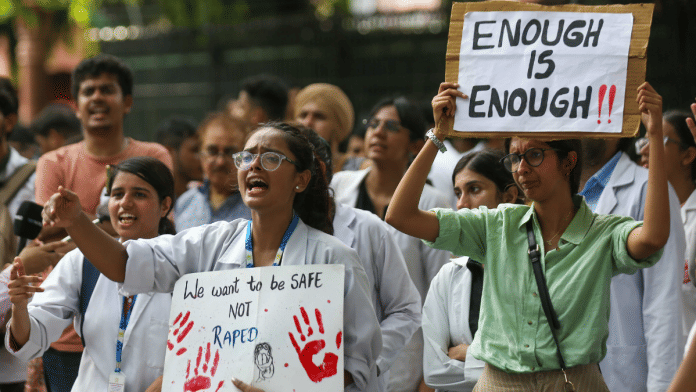New Delhi: Noting that almost all states have laws in place catering to the demand of security, the Centre ruled out bringing in a ‘Central Protection Act’ that provides equal protection to healthcare workers through a uniform framework.
The Union health ministry, instead, has issued an order to increase security by 25 percent in all central government medical hospitals. It also has formed a committee to look into strengthening security and safety of healthcare personnel at workplaces after extensive consultations with stakeholders.
This development comes in the backdrop of demands and an ongoing strike by resident doctors in government colleges across the country following the rape-murder of a resident doctor in Kolkata’s R.G. Kar Hospital.
The Indian Medical Association (IMA) is backing agitating doctors who are demanding that the Centre should reconsider a 2019 draft bill — the Healthcare Services Personnel and Clinical Establishments (Prohibition of Violence and Damage to Property) Bill — that was junked following objection by the Ministry of Home Affairs.
Top officials in the health ministry assured that the deployment of marshals would also be examined depending on the need in the hospitals. Their deployment, besides the standard security protocols, would also be approved based on individual demands from central government hospitals after an assessment of security in their premises, they added.
“Several states and Union Territories — a total of 26 — have passed legislations to protect healthcare service personnel,” a senior health ministry official told ThePrint Monday.
These states include Andhra Pradesh, Assam, Bihar, West Bengal, and Tamil Nadu, the senior official said, adding that offences are both cognizable and non-bailable under these legislations.
Most state acts define healthcare service personnel to include doctors, nurses, medical and nursing students, and paramedical staff. These acts also define violence as activities causing harm, injury, endangering life, intimidation, obstruction to the ability of a healthcare service person to discharge their duty and loss or damage to property in a healthcare institute.
Regarding the Kolkata case, the senior official said that the nature of the crime is covered under other provisions of laws which are common for all.
“We have accepted all the demands of the doctors on strike and also a committee is being formed to strengthen security at the workplace after extensive consultation with all stakeholders. We appeal to the doctors to come back to work and ensure that patients are not put to further trouble,’’ said the ministry official.
Additionally, the government is also set to call for a meeting of all heads of central government hospitals soon to take stock of all the security measures put in place for their employees in light of the Kolkata incident.
“Institutional FIR in case of violence, additional infrastructural security including CCTV, extra lighting is part of the advisory issued to hospitals to ensure that employees are safe while on duty. A central act is not needed when provisions already exist. Their proper implementation is the need of the hour,’’ added the official.
The IMA, however, contends that state legislations were ineffective. “The state laws for the protection of healthcare workers have been largely ineffective as cops struggle to apply in the context of the Indian Penal Code (now, the Bharatiya Nyaya Sanhita). The issues of assaults at hospitals will not be resolved unless there is a central framework to address the issue,” IMA president Dr R.V.Asokan had told ThePrint Saturday.
(Edited by Tony Rai)
Also Read: Mamata govt’s new programme to ensure women’s safety includes SOS app, request to ‘avoid night duty’






